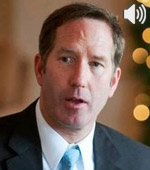Poll: Americans Overwhelmingly Favor FCC Chairman Pai’s “Light Touch” Internet Regulatory Approach
Activists advocating heavy-handed internet regulation of the type pushed by the Obama-era Federal Communications Commission (FCC) pretend that they’re the ones crusading on behalf of everyday consumers. The reality is that the internet flourished as no innovation in human history precisely because both the Clinton Administration and Bush Administration maintained a “light touch” regulatory stance from the FCC.
But then in 2015, the Obama Administration decided that it must “fix” an internet that wasn’t broken, through a narrow party-line FCC vote to regulate internet service as a “public utility” under 1930s laws enacted for copper-wire telephones.
The result: internet infrastructure investment fell for the first time ever outside of an economic recession.
Fortunately, new FCC Chairman Ajit Pai is restoring common sense by returning internet regulation to the “light touch” approach that worked for two decades and under Clinton and Bush.
Now there’s more good news, highlighted by the good folks over at the Institute for Policy Innovation (IPI). According to a new Morning Consult survey, Americans overwhelmingly favor a light-touch FCC regulatory approach toward internet service:
– By an overwhelming 78% to 12% margin, voters support the government having little or no regulation of the internet, with 53% supporting a ‘light touch’ and 25% asserting that the government should not regulate the internet at all.
– By an 18-point margin (51% versus 33%), voters say the internet should not be regulated as a public utility.
– By a two-to-one margin, voters believe regulating the internet as a utility would slow innovation and decrease private tech investment.
– Support for light-touch regulation is bipartisan, including 55% of Democrats, 52% of Republicans, and 52% of Independents. Perhaps surprisingly, 21% of Democrats favor NO government regulation of the internet, along with 27% of Republicans and 26% of Independents.”
Chairman Pai is demonstrating admirable courage and leadership in restoring regulatory sanity at the FCC, and it’s always encouraging to confirm that the American electorate agrees with him.

 Timothy Lee, CFIF’s Senior Vice President of Legal and Public Affairs, discusses why the fight to overturn the FCC’s so-called “Net Neutrality” Order should continue, litigation surrounding he Order, and why this isn’t just an issue for the telecommunications industry.
Timothy Lee, CFIF’s Senior Vice President of Legal and Public Affairs, discusses why the fight to overturn the FCC’s so-called “Net Neutrality” Order should continue, litigation surrounding he Order, and why this isn’t just an issue for the telecommunications industry. In a recent interview with CFIF, Phil Kerpen, President of American Commitment, discusses the Supreme Court’s decision to grant cert in the ObamaCare subsidies case, how a key architect of ObamaCare made news recently by boasting about taking advantage of “the stupidity of the American voter,” and what’s wrong with President Obama’s intervention in the FCC’s plans to regulate the Internet.
In a recent interview with CFIF, Phil Kerpen, President of American Commitment, discusses the Supreme Court’s decision to grant cert in the ObamaCare subsidies case, how a key architect of ObamaCare made news recently by boasting about taking advantage of “the stupidity of the American voter,” and what’s wrong with President Obama’s intervention in the FCC’s plans to regulate the Internet.  In an interview with CFIF, Mike Wendy, director of
In an interview with CFIF, Mike Wendy, director of  CFIF Freedom Line Blog RSS Feed
CFIF Freedom Line Blog RSS Feed CFIF on Twitter
CFIF on Twitter CFIF on YouTube
CFIF on YouTube